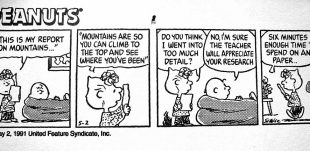The end of all things [embedded content]
Read More »Pandemic depression antidote (XXII)
Pandemic depression antidote (XXII) [embedded content]
Read More »Hegel — wenn der Geist aufs Ganze geht
Hegel — wenn der Geist aufs Ganze geht [embedded content] Georg Wilhelm Friedrich Hegel ist unbestritten einer der wichtigsten philosophischen Denker der Neuzeit. Aber — 250 Jahre nach der Geburt des deutschen Philosophen kann man sich fragen: Was bleibt von Hegel? Wer war er? Was wollte er? Und wie würde er unsere Gegenwart und Zukunft fassen?
Read More »Econometrics — science based on questionable presumptions
Econometrics — science based on questionable presumptions What we are asked to assume is that the precept can be carried out in economics by techniques which are established for linear systems, serially independent disturbances, error-free observations, and samples of a size not generally obtainable in economic time series today. In view of such limitations, anyone using these techniques must find himself appealing at every stage less to what theory is...
Read More »Mathematical slavery
None of this is an argument in favor of taking a road along which there is less rigorous thinking. Our problem is much more that we have developed our models using certain mathematical techniques and that we have become slaves to those techniques. It is surely this more than anything else that has led us to persist with a model that, to any outsider, seems such a poor description of what actually happens in markets. The real world is one in which various market forms coexist,...
Read More »You can’t touch this
You can’t touch this [embedded content]
Read More »Jag ska fånga en ängel
Jag ska fånga en ängel [embedded content] Människor som det på något vis känns som om de varit med oss hela livet är alltid svårt att mista. Det är en tröst att Teds och Kenneths underbara musik fortfarande finns kvar — men att de inte längre vandrar vid min sida kommer jag aldrig att kunna förlika mig med.
Read More »Genius of the week
Genius of the week [embedded content] Confirms — again — what we already knew: Trump is a reckless, untruthful, outrageous, incompetent and undignified buffoon!
Read More »Keynes’ fundamental insight
The difficulty lies, not in the new ideas, but in the escaping from the old ones, which ramify, for those brought up as most of us have been, into every corner of our minds. John Maynard Keynes [embedded content]Mark Blaug (1927-2011) did more than any other economist to establish the philosophy and methodology of economics a respected subfield within economics. His path-breaking The methodology of economics (1980) is still a landmark (and the first textbook on economic...
Read More »All human beings
[embedded content]
Read More » Lars P. Syll
Lars P. Syll


